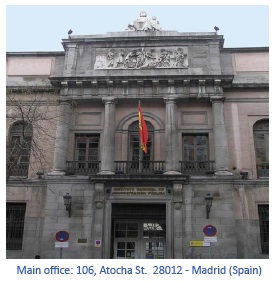|
How to make public sector recruitment cool!
ATP joins with EPSO to create a Special Interest Group for Public Sector Recruitment
by David Bearfield, Director, European Personnel Selection Office (EPSO)
Following the first highly successful International Public Sector Assessment for Recruitment conference (IPSAR), organised in 2012 in Madrid  by the Association of Test Publishers (ATP) and the European Personnel Selection Office (EPSO), ATP and EPSO have joined together to seek support for the establishment of an ATP Special Interest Group (SIG). The purpose of the group will be to help public sector recruiters to meet the challenges we face by promoting best practice, and enabling us to help each other. by the Association of Test Publishers (ATP) and the European Personnel Selection Office (EPSO), ATP and EPSO have joined together to seek support for the establishment of an ATP Special Interest Group (SIG). The purpose of the group will be to help public sector recruiters to meet the challenges we face by promoting best practice, and enabling us to help each other.
Why? Today, the public sector collectively faces unprecedented challenges in unprecedented times. And yet … these challenges – together with technological progress and the entry of a new generation to the job market, also present all of us who are engaged in public sector assessment and recruitment with a real window of opportunity. By its very nature, the public sector needs a high quality, modern and demonstrably fair recruitment process. "For the public sector to continue to attract the best talent … they will have to attract, retain, and develop the right talent ".1 Efficient, effective and equitable testing processes are a key component of public sector recruitment, but we often seem to lag behind when it comes to optimising our procedures. Faced in many parts of the world with the retirement of an entire generation of public servants, and in others with the pressing need to build the capacity and capability of public management, there is major scope for us to work and learn together to attract and select the brightest and best.
The inaugural meeting of this proposed SIG will take place during the annual ATP Conference in 2014 in Scottsdale, Arizona. Its purpose will be to formally establish the group and to launch the planning for the 2nd International Public Sector Assessment and Recruitment Conference, to take place later in 2014.
The challenge of public sector recruitment
 "It may seem counterintuitive to be talking about managing talent when public sector organisations are downsizing. But at times like this, it's crucial to focus on the fundamentals of attracting, retaining and engaging high-calibre people". 2 "It may seem counterintuitive to be talking about managing talent when public sector organisations are downsizing. But at times like this, it's crucial to focus on the fundamentals of attracting, retaining and engaging high-calibre people". 2
Today, the public sector as a whole faces two key challenges – managing in times of austerity and the impending retirement of the baby boom generation - with the significant depletion of expertise and experience that this implies, and the inevitable necessity for those remaining to do more, with less. Our challenge is to attract the best at a time when the public sector is sometimes seen as being the cause of the current economic problems, rather than the solution. The public sector, whose strength has traditionally been in its absorption capacity - in other words to ride out difficult times and to take the long view - rather than its agility. Increasingly, it will have to deal more and more with a VUCA world: Volatile, Uncertain, Complex and Ambiguous.3 Emerging economies have the additional challenge of building the capacity and capability of their civil services to enable them to keep pace with and exploit the benefits of economic growth. An important part of that will be the task of building modern and effective selection processes at the front end.
Against this background of rapid change, coupled with loss of talent and experience, public services across the globe are going to have to compete in an ever-tougher war for talent. At the same time, many elements of the traditional public sector attraction package (job for life, final salary pensions) are under threat, or even seen as outdated and irrelevant by the Y and Millennial generations. If the sector as a whole is to be able to attract and select the brightest and best it will, in the words of US President Obama when addressing the issue of US public sector recruitment, have to focus on "how we can make it cool again". A major part of this challenge will fall to the testing community. Rather than lagging behind, the public sector needs to become the leader in using technology. The use of video, animation and serious gaming, for example, tools usually seen as the preserve of the private sector, will need to be taken up by the public sector if it is to have attractive, modern, efficient, accountable, fair and cost-effective procedures.
With all this in mind, it is in the public sector's interests as a whole to come together as an international community. We all face similar problems, and in the current economic climate it can only be to our advantage to pool resources and exchange ideas instead of reinventing the wheel.
By setting up this dedicated Group, affiliated to the world's leading testing association, we can help each other meet these challenges.4
So what is the immediate key challenge to be tackled?
"Civil servants have become de-privileged in terms of their status in society and conditions of employment. As a result, young graduates generally do not feel attracted to working in government".5
At a time of huge boomer retirement levels, the public sector must attract new talent for the future, but in order to attract the right people it needs this same boomer generation (the current leaders) to understand and accept that it requires a recruitment system which is modern, attractive and not outdated to the future generations - otherwise it will simply attract mediocrity! As a first step, an employee-centric, solid and inspirational Employer Value Proposition (EVP) needs to be established across the sector to improve its reputation so that it becomes THE place of choice for the brightest and best. "Only with the right mix of leadership and skills, and a concerted effort to attract and retain the best and brightest, will the public sector emerge in better shape to tackle new challenges."6
We need to hear from you! If you agree that there is value for your organisation in working together in this eay, please express your interest by sending an email to: [email protected] by 15th December 2013.
_____________________________________________________________________________________________________
1Hudson, public sector talent management: the influence of the private sector
2 INTHEBLACK, What's the best way to attract and retain public sector talent? 20.6.2013 Scott Hartley, Grant Thornton.
31990's term derived from military vocabulary but which today is used more in the world of strategic leadership in organisations.
4Hudson, public sector talent management: the influence of the private sector.
5OECD July 2004 policy brief.
6INTHEBLACK, What's the best way to attract and retain public sector talent? 20.6.2013 Scott Hartley, Grant Thornton
|


 by the Association of Test Publishers (ATP) and the European Personnel Selection Office (EPSO), ATP and EPSO have joined together to seek support for the establishment of an ATP Special Interest Group (SIG). The purpose of the group will be to help public sector recruiters to meet the challenges we face by promoting best practice, and enabling us to help each other.
by the Association of Test Publishers (ATP) and the European Personnel Selection Office (EPSO), ATP and EPSO have joined together to seek support for the establishment of an ATP Special Interest Group (SIG). The purpose of the group will be to help public sector recruiters to meet the challenges we face by promoting best practice, and enabling us to help each other. "It may seem counterintuitive to be talking about managing talent when public sector organisations are downsizing. But at times like this, it's crucial to focus on the fundamentals of attracting, retaining and engaging high-calibre people".
"It may seem counterintuitive to be talking about managing talent when public sector organisations are downsizing. But at times like this, it's crucial to focus on the fundamentals of attracting, retaining and engaging high-calibre people".